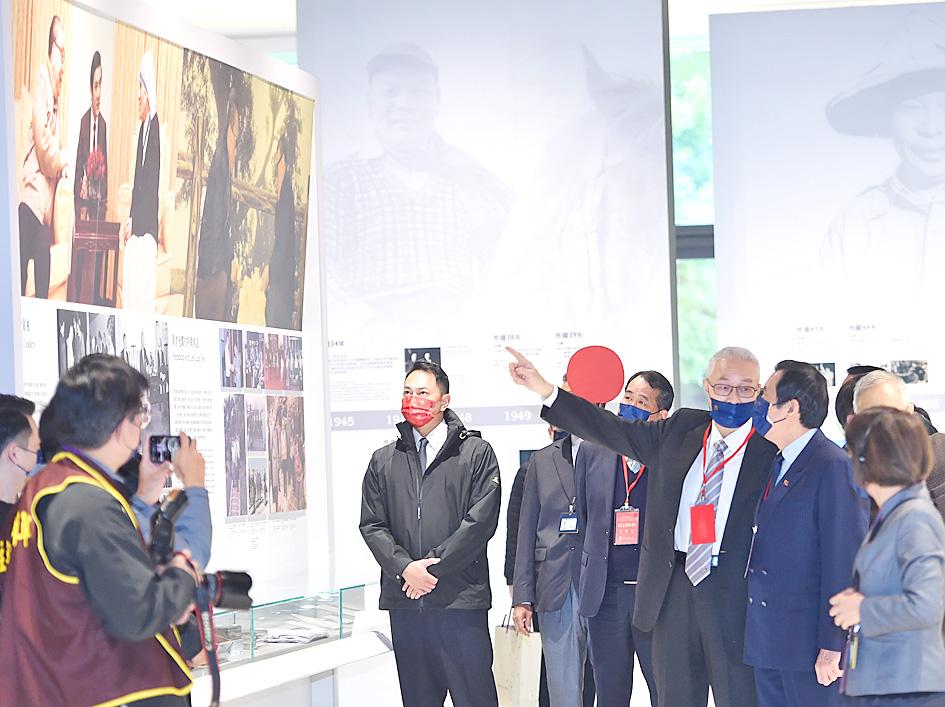Former president Chiang Ching-kuo (蔣經國) showed his greatness in ending martial law despite his background and connection to the authoritarian government, former president Ma Ying-jeou (馬英九) said yesterday at the opening of a park in honor of Chiang.
The Ching-kuo Chi-hai Cultural Park (經國七海文化園區) in Taipei’s Dazhi (大直) area includes Chiang’s former home — known as the Seven Seas Residence (七海寓所) — and the Chiang Ching-kuo Presidential Library.
It is the first library dedicated to the commemoration of a president in Taiwan and holds great historic and cultural value, Ma said.

Photo: Liu Hsin-de, Taipei Times
The library’s use of green architecture and purpose as an educational space is in line with Chiang’s customary low profile, said Ma, who was Chiang’s English secretary for seven years starting in 1981.
Ma said that in 1985, Chiang received a letter from Richard Ciccolella, the former head of the US Military Assistance Advisory Group in Taiwan, who urged Chiang to lift martial law as soon as possible.
After learning how the West viewed martial law, Ma said that Chiang responded with a frown, saying that Taiwan was not governed by the military, nor was it lawless.
Along with the recommendation from then-representative to the US Frederick Chien (錢復) that Taiwan lift martial law, Chiang on Oct. 7, 1986, announced during a meeting in Taipei with then-Washington Post publisher Katharine Graham that martial law would be lifted, Ma said.
Taiwan’s martial law, which was imposed on May 20, 1949, ended on July 15, 1987, which was at that time the world’s longest imposition of martial law by a regime.
Broadcasting Corp of China chairman Jaw Shaw-kong (趙少康), who also attended the park’s opening, said that President Tsai Ing-wen’s (蔡英文) attendance was a good sign, adding that the nation should unite and work toward a common future.
He said that Tsai’s presence defeated the Transitional Justice Commission’s criticism made the previous day that the establishment of the library and park glorified an authoritarian figure.
Chinese Nationalist Party (KMT) Chairman Eric Chu (朱立倫) wrote on Facebook yesterday that the Tsai administration was using the commission as a political tool against the principles and spirit of transitional justice.

US climber Alex Honnold is to attempt to scale Taipei 101 without a rope and harness in a live Netflix special on Jan. 24, the streaming platform announced on Wednesday. Accounting for the time difference, the two-hour broadcast of Honnold’s climb, called Skyscraper Live, is to air on Jan. 23 in the US, Netflix said in a statement. Honnold, 40, was the first person ever to free solo climb the 900m El Capitan rock formation in Yosemite National Park — a feat that was recorded and later made into the 2018 documentary film Free Solo. Netflix previewed Skyscraper Live in October, after videos

Starting on Jan. 1, YouBike riders must have insurance to use the service, and a six-month trial of NT$5 coupons under certain conditions would be implemented to balance bike shortages, a joint statement from transportation departments across Taipei, New Taipei City and Taoyuan announced yesterday. The rental bike system operator said that coupons would be offered to riders to rent bikes from full stations, for riders who take out an electric-assisted bike from a full station, and for riders who return a bike to an empty station. All riders with YouBike accounts are automatically eligible for the program, and each membership account

NUMBERS IMBALANCE: More than 4 million Taiwanese have visited China this year, while only about half a million Chinese have visited here Beijing has yet to respond to Taiwan’s requests for negotiation over matters related to the recovery of cross-strait tourism, the Tourism Administration said yesterday. Taiwan’s tourism authority issued the statement after Chinese-language daily the China Times reported yesterday that the government’s policy of banning group tours to China does not stop Taiwanese from visiting the country. As of October, more than 4.2 million had traveled to China this year, exceeding last year. Beijing estimated the number of Taiwanese tourists in China could reach 4.5 million this year. By contrast, only 500,000 Chinese tourists are expected in Taiwan, the report said. The report

Temperatures are forecast to drop steadily as a continental cold air mass moves across Taiwan, with some areas also likely to see heavy rainfall, the Central Weather Administration (CWA) said. From today through early tomorrow, a cold air mass would keep temperatures low across central and northern Taiwan, and the eastern half of Taiwan proper, with isolated brief showers forecast along Keelung’s north coast, Taipei and New Taipei City’s mountainous areas and eastern Taiwan, it said. Lows of 11°C to 15°C are forecast in central and northern Taiwan, Yilan County, and the outlying Kinmen and Lienchiang (Matsu) counties, and 14°C to 17°C